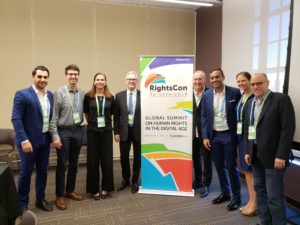by Gabriel Levitt, President, PharmacyChecker.com and Prescription Justice | Sep 7, 2018 | Internet Censorship
 The future of your ability to buy lower-cost medicine online from another country was indirectly discussed recently during congressional hearings with Facebook Chief Operating Officer, Sheryl Sandberg, and CEO and founder of Twitter, Jack Dorsey.
The future of your ability to buy lower-cost medicine online from another country was indirectly discussed recently during congressional hearings with Facebook Chief Operating Officer, Sheryl Sandberg, and CEO and founder of Twitter, Jack Dorsey.
The issues on the table were much more grandiose-sounding than importation from Canada or buying medication internationally using the Internet. Russian meddling in our elections; political bias on Twitter against conservative and Republican ideas; personal privacy protection; and lots of discussions that affect 1st Amendment protections.
The takeaway by some experts is that Congress is getting ready to regulate the Internet.
As it applies to online access to safe and affordable medicine, Internet regulation could lead to access protections or access denied. In short, the pharmaceutical industry is actively engaged in driving safe international online pharmacies offline. The industry can often get what it wants from Congress and so the dangers of Internet censorship to block access to or shutdown international online pharmacies are real.
For a variety of posts on this, see our section on Internet Censorship.
Google’s top executives were invited to the hearings yesterday, but they declined to attend. Some accused them of being arrogant. But the company itself noted that search engines, like Google and Bing, are not the same as social media networks, like Facebook, Twitter, and Instagram. Google’s search engine was not used by bad actors in the way that occurred on Facebook, for example.
Google’s absence reminded me of Ms. Sandberg’s appearance at another Congressional hearing when she was vice president of global sales for Google in 2004. That hearing of the Committee on Governmental Affairs; Permanent Subcommittee on Investigations focused on Internet access to medication and importation. In prepared remarks, Ms. Sandberg stated Google’s position on importation and online pharmacies:
“As a provider of Internet-based information tools, Google has no position on the broader merits of the drug importation debate, or on the optimal mechanisms for regulation of online pharmacies; rather, our interest is to preserve the ability of Internet users to find useful and relevant information, including information about licensed pharmacies.”
That was then; this is now. Fast forward to last spring: Google has made a deal with the FDA that undermines its earliest and best principles as articulated by Ms. Sandberg. That deal is not about blocking Canadian pharmacy ads on Google. That’s old news in bad policy-making. The new deal is that Google will remove search results if asked by the FDA, based on its administrative decisions, without a court order. These are so called “organic” searches, not paid results.
To date, the FDA has yet to use this new permission from Google to censor safe international online pharmacies. And it continues to use due process through warning letters to rogue online pharmacies, as it did to combat sites selling tramadol without a prescription. I agreed with the FDA on that action because those sites have proven to harm people who are addicted to opioids.
But, you know, pharmaceutical companies have spent four billion dollars lobbying Congress over the last 20 years or so. And if Congress is legislating new regulations to control behavior on the Internet, Pharma won’t be far behind with its goal to stop Americans from buying more affordable meds online.
Tagged with: facebook, Google, politics, Sheryl Sandberg, twitter
by Gabriel Levitt, President, PharmacyChecker.com and Prescription Justice | Jul 31, 2018 | Internet Censorship

The pharmaceutical industry, generally, does not like our company. As an extension of that feeling, the FDA doesn’t love us either. Basically, we are in Big Pharma’s crosshairs because the information we provide helps people find more affordable medicines from other countries and import it for personal use.
But is that a reason for Instagram to shutdown our account!? That action is nothing less than corporate-inspired, government-encouraged censorship. Mike Masnick of TechDirt refers to this as the soft underbelly of Internet censorship. Also, please read this background from the Electronic Frontier Foundation calling out Big Pharma on this issue.
Congress and the FDA are banging on the door of Facebook, Google, Instagram, etc. about stopping people from selling opioids on their platforms. We can debate until the cows come home about what content should be self-censored — meaning removed without a court order — but please hear me out on why Instagram’s dissing PharmacyChecker doesn’t even come close to acceptable and let us know if you agree or disagree.
First of all, PharmacyChecker.com does not sell or facilitate the sale of medication. Medications are not purchased on our site and we have no role in the processing of prescription orders. We verify credentials and publish information about online pharmacies and drug prices. That information is globally accessible on the Internet.
By the way, our Verification Program bans online pharmacies that ship controlled drugs of any kind into the U.S. This includes not only prescription opioids, but also Valium, Xanax, and Adderall. We’re with the DEA on strict controls and highly attuned to and concerned about the opioid crisis. I have friends who view our policy as too conservative. You get the picture.
We agree with cracking down against dealers of opioids, with Fentanyl being the greatest concern. On the other hand, we have seen Pharma and the government use a crackdown against addictive prescription drug sales online to veer into a crackdown against imports from Canada of decidedly regular meds that treat asthma, diabetes, depression, high cholesterol and blood pressure, etc.
We launched PharmacyChecker in 2003 to help people searching the Internet for lower medicine prices from real pharmacies, domestic and international. Our verification program is run by a licensed PharmD from Massachusetts, Dr. Shivam Patel. Pharmacies listed in our program must require valid prescriptions, sell only personal-use quantities, have a pharmacy license, and cannot sell controlled drugs of any kind internationally, into the U.S.
Feel free to read about our extensive protocols for verifying international online pharmacies.
In 2012, I was asked to write a chapter in a book called Hacking Politics, which is now published as an anthology about the battle to kill the Stop Online Piracy Act. My chapter was called the “Online Pharmacy Story.” In short, due to lobbying by the pharmaceutical industry, SOPA contained language that would have potentially made PharmacyChecker.com illegal at a maximum; at minimum, it would have increased our intermediary liability exposure. I strongly opposed it. And yet we see big industries moving SOPA by a thousand cuts.
I believe there’s some chance that Instagram dissed our account accidentally, based on a sweep of sites having to do with drugs, medicines, pharmacies, etc. But there’s also a small chance that Pharma’s influence led to the direct shutdown of our account as a slap in the face to PharmacyChecker advocacy efforts. I’m constantly criticizing Pharma’s propaganda about importation and online pharmacies our blog, in the New York Times, RightsCon, and directly to members of Congress in my testimony.
In fact, last year I caught PhRMA, meaning the big pharma trade association, placing Google ads using our name to dissuade people against importation of lower-cost medicines. As I wrote in our blog, that was a badge of honor but kind of disconcerting as well.
Late last month, the FDA called Instagram, Google, Reddit, and many others, to what was called the FDA Opioid Online Summit. I blogged about it beforehand mostly to note that groups funded by Pharma were well represented, ones that focus on opposing importation of lower-cost medicines and use the opioid crisis for that goal. Initially, the summit was billed as a public event, but it turns out that journalists were locked out and those that covered the public part did conclude that opioids were not the sole target, but cheaper meds were open season, too.
We want our Instagram account reinstated on principle, yet no one has responded to our multiple attempts at contacting Instagram’s customer support.
Anyone willing to weigh in on this?
Tagged with: Instagram, opioids, Stop Online Piracy Act
by Gabriel Levitt, President, PharmacyChecker.com and Prescription Justice | Jun 26, 2018 | Internet Censorship
 This past month, Congress passed a flurry of bills dedicated to stopping the devastation of the opioid crisis. One focus is on stopping illegal opioid imports from coming in though the U.S. mail. The Synthetics Trafficking and Overdose Prevention Act, which passed in the House, is one such bill. But as I wrote in the The Hill last year, the STOP Act could also enable the FDA to more easily prevent Americans from importing lower-cost, safe and effective medicines from Canada and other countries.
This past month, Congress passed a flurry of bills dedicated to stopping the devastation of the opioid crisis. One focus is on stopping illegal opioid imports from coming in though the U.S. mail. The Synthetics Trafficking and Overdose Prevention Act, which passed in the House, is one such bill. But as I wrote in the The Hill last year, the STOP Act could also enable the FDA to more easily prevent Americans from importing lower-cost, safe and effective medicines from Canada and other countries.
The FDA is also fighting the opioid crisis by scrutinizing the Internet as a channel of illegal sales. That, too, could lead to the curtailment of access to lower-cost, imported medicines from pharmacies, ones which don’t sell opioids or controlled drugs at all, but do help people afford medicines.
Ideally, people who use a search engine, such as Google, find information based on an objective search algorithm. With tens of millions of Americans not filling prescriptions due to high prices here at home, many are Googling to find and order cheaper medication from international online pharmacies. (more…)
Tagged with: Enforcement, Google, U.S. Food and Drug Administration, Volokh Conspiracy
by Gabriel Levitt, President, PharmacyChecker.com and Prescription Justice | May 23, 2018 | Internet Censorship

From left to right: Aria Iliad Ahmad, me, Dr. Jillian Clare Kohler, Tim Smith, Ron Andruff, Dr. Shivam Patel, Tracy Cooley, and Robert Guerra.
Last year I organized a panel at a conference called RightsCon to bring together Internet freedom and medicines rights activists to talk about buying medication online. And last week, I participated on a panel at RightsCon in Toronto that continued and strengthened those initial efforts. It was an honor to be on that panel, especially to hold discussions with academic experts in pharmaceutical safety and access with important roles working with the World Health Organization (WHO).
For those of you who are new to this blog, the work at RightsCon is directly relevant to PharmacyChecker’s mission to inform patients about safe and lower-cost medication options available on the Internet. Essentially, large pharmaceutical companies are lobbying governments and Internet companies to take actions that will prevent you from getting less expensive medications. This is also an issue about free speech and Internet freedom that should increasingly attract even more digital rights activists. Big Pharma is pressuring governments to pressure Internet gatekeepers to take down content. This is the Stop Online Piracy Act by a thousand cuts. We are trying to push back against that.
RightsCon is an annual conference focusing on the intersection of human rights and digital rights (issues related to the Internet). Access to medication has become an important issue at the United Nations, including by the Human Rights Council, which passed a resolution in 2016 declaring access to essential medicines a human right. Also, the UN convened a panel in 2016 dedicated to this issue, called the UN High Level Panel on Access to Medicines. Thus, the title of this year’s panel was Making Safe Online Access to Affordable Medication Real: Address the UN Human Rights resolution for access to essential medicines. (more…)
Tagged with: and Robert Guerra, Aria Iliad Ahmad, brussels principles, Dr. Jillian Clare Kohler, Rightscon, Ron Andruff, Shivam Patel, Tim Smith, Tracy Cooley
by Lucia Mueller, President, PharmacyChecker.com | Jul 10, 2017 | Drug Prices, Government, Internet Censorship, Legislation
 Click here to read the English version!
Click here to read the English version!
This article was originally published in English under the title “Minority Communities Needing Better Healthcare Means Highlighting Safe and Affordable Online Pharmacies” on the PharmacyChecker Blog on June 30th, 2017. It has since been translated by Pedro Díaz into Spanish.
En medio de un débil intento de Washington para “resolver” el problema de la seguridad social, los americanos seguimos encontrando obstáculos al tratar de dar prioridad a la salud de nuestras familias. Mientras tanto, los costos de los medicamentos siguen aumentando. Esto, en particular, pone en riesgo a las comunidades minoritarias.
La crisis que representa el aumento en el precio de los medicamentos va más allá de los grupos minoritarios, pero hay estudios que muestran que, comparados con el resto de la población, los hispanos son más propensos a no seguir sus recetas médicas debido al costo. Lo que es peor, ahora que los inmigrantes tienen miedo de salir de casa, es incluso menos probable que los indocumentados consigan los medicamentos que necesitan. Sin importar tu posición en cuanto al tema de inmigración, esta tendencia es inaceptable y debe combatirse educando a la gente sobre la existencia de precios más bajos fuera de los Estados Unidos; y sin embargo hay quienes siguen sin entenderlo…
(more…)
Tagged with: Drug Prices, healthcare, minority communities, Online Pharmacy
by Gabriel Levitt, President, PharmacyChecker.com and Prescription Justice | Jun 23, 2017 | Internet Censorship

Principles to guide the Internet community on ethical medication sales
A few months back, I wrote about a panel that I put together as part of my work with PharmacyChecker.com and Prescription Justice, a non-profit group dedicated to ending the crisis of high drug prices in America. The panel was one of hundreds of sessions at the RightsCon Conference in Brussels, an event that brings together Internet freedom, human rights and social justice activists. The panel discussed issues related to buying medication online, Internet freedom, importation and drug affordability – and the negative impact of the pharmaceutical industry on all of the above.
Essentially, drug companies have spent millions of dollars on funding “non-profit” groups, public relations efforts, lobbying Congress and international organizations, Interpol (I kid you not), etc., with the goal of making it hard, if not impossible, for people to buy safe and lower cost medication online from other countries, which include people in America, that can’t afford it locally. Their activities intentionally conflate the intentional sale of counterfeit and substandard drugs with safe international online pharmacies.
The panel was a great step forward in giving the consumer side of this issue a larger voice. The panelists discussed and edited a draft set of principles on medication sales and the Internet. It took a while, but, on June 15, 2017, Knowledge Ecology International and Prescription Justice finalized and endorsed what we’re calling the Brussels Principles, which are published below. (more…)
Tagged with: accessnow, brussels principles, KEI, Rightscon
 The future of your ability to buy lower-cost medicine online from another country was indirectly discussed recently during congressional hearings with Facebook Chief Operating Officer, Sheryl Sandberg, and CEO and founder of Twitter, Jack Dorsey.
The future of your ability to buy lower-cost medicine online from another country was indirectly discussed recently during congressional hearings with Facebook Chief Operating Officer, Sheryl Sandberg, and CEO and founder of Twitter, Jack Dorsey.


 This past month,
This past month, 


